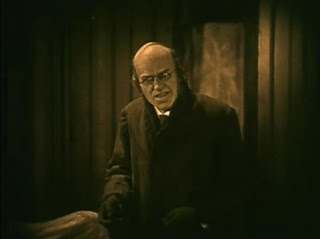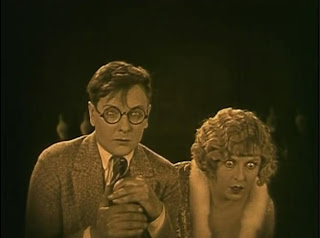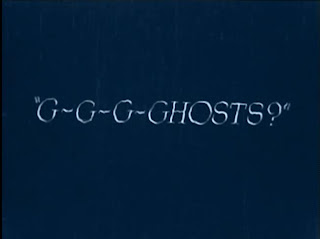The Cat and the Canary (1927)
The Story
Cyrus West didn’t exactly have a happy life. His final years were spent trying to fend off his relatives, all of whom believed he was insane, but still wanted his mansion and inheritance. He found himself as the proverbial canary surrounded by cats. Perhaps to his relief, he passed away, but in accordance with his will, his inheritance was to be held until the 20th anniversary of his death. On the anniversary, his relatives reassemble to hear the reading of the will, including his nieces Annabelle and Cecily, his sister Susan, and his nephews Paul, Harry, and Charlie.
The lawyer, Crosby, reads the will and reveals that Cyrus’ inheritance will be given to Annabelle under the stipulation that she be ruled as sane. If Annabelle is found to not be sound in mind, then the inheritance is to be given to another relative, whose identity is not immediately revealed.
A guard barges in on the family as they are preparing to eat dinner, saying that a lunatic has just escaped and is on the loose. He’s known as the Cat and he tears into his victims like they were canaries. He believes that the Cat is either on the grounds or in the house. Meanwhile, Crosby attempts to tell Annabelle who is second-in-line for the inheritance, so that she may protect herself, when he disappears at the hands of the Cat.
 |
| The Cat |
Reflection
Paul Leni directed this film adaption of the play by John Willard and his background as a German expressionist shows in this early thriller, including in the atmosphere and the lighting. Some of its traits are reminiscent of “The Cabinet of Dr. Caligari.” In fact, the doctor brought to the mansion to examine Annabelle resembles Werner Krauss’ appearance as Dr. Caligari.
 |
| The Doctor |
The suspenseful moments carry just as much suspense as “Caligari” or “Nosferatu,” and the film became standard for Universal horror films that followed, particularly those in the “haunted house” tradition.
 |
| Annabelle sleeps while the Cat lurks |
Creighton Hale, a D.W. Griffith veteran who had appeared in the dramas “Way Down East” and “Orphans of the Storm,” plays a lovable bumbling buffoon who endears himself very quickly to the audience. As Paul Jones, he’s a leading man who get the leading woman, but does so without bravado or being a stereotypical “lover.” In fact, his mannerisms and character remind me of Harold Meadows, Harold Lloyd’s lovable lead from the film “Girl Shy.”
 |
| Paul and cousin Cecily |
Like “Caligari,” “Canary” is a silent film that has benefited greatly from restoration and film tinting. The quality is very impressive and the picture is remarkably clear. And the film definitely benefits from the tinting to convey mood and time. Perhaps no scene illustrates this effectiveness better than this particularly startling scene featuring Laura La Plante below.
I think Joe Franklin says it best in his “Classics of the Silent Screen,” “It must be admitted that the film doesn’t survive the years without creaking a little, but this is not so much due to defects in the film itself as to the fact that it was really a blueprint of its own species. The format has now been repeated so many times since, the sliding panels and clutching hands degenerating through the years into such casual cliches that the original just doesn’t have the same punch it had in 1927.”






No comments:
Post a Comment